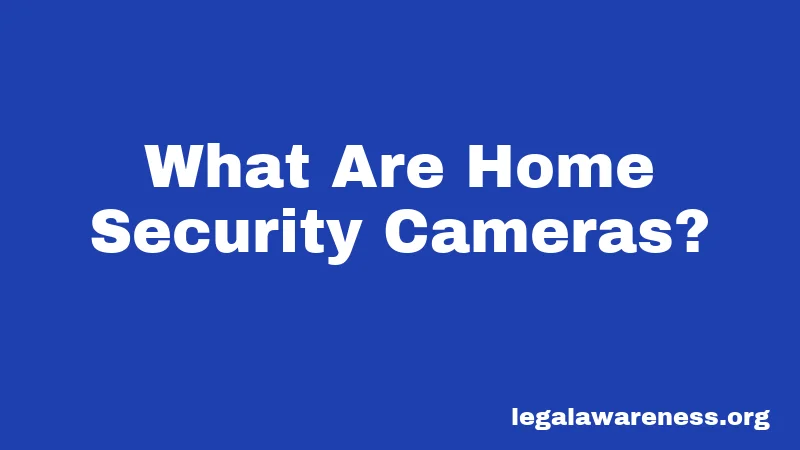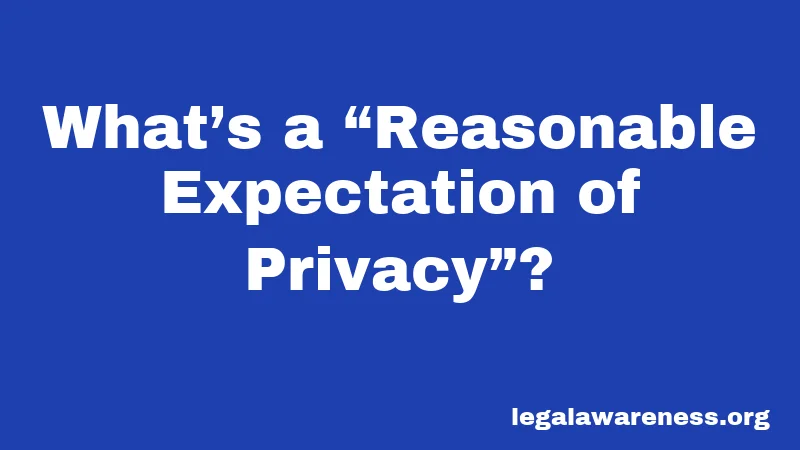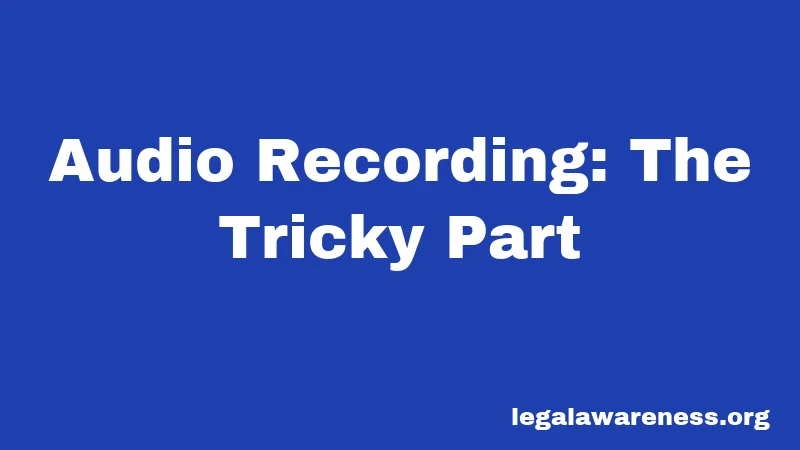Texas Home Security Camera Laws (2026): Your Rights and Boundaries
Most people don’t realize their security camera can get them in serious legal trouble. Not in the way you might think though. In Texas, your cameras are totally fine. The problem comes when you point them where you shouldn’t. Let’s break down exactly what’s legal and what will land you in hot water.
You’re not alone if this confuses you. These rules trip up a lot of homeowners. The good news? Once you understand the basics, you’ll know exactly where your cameras can go and when you need to be careful about audio.
What Are Home Security Cameras?

Home security cameras are devices that record video on your property. They come in all shapes and sizes—tiny dome cameras, obvious box cameras, or hidden ones. Some have audio. Some don’t. Some record 24/7. Others only turn on when they detect movement.
Here’s the thing about cameras in Texas: video is your friend. Audio? That’s where things get tricky. Stay with me here, because the audio rules are actually super important.
Can You Install Security Cameras in Texas?
Good news. Yes, you can install security cameras on your property in Texas. Yep, that’s legal.
You can place them at your front door. You can put them on your back patio. You can set them up on your garage or pointed at your driveway. The Texas courts support homeowners’ rights to protect their property. You don’t need a special license to install cameras in your own home either. Pretty straightforward.
But here’s the catch (you knew there was one): you can only record areas where people don’t have a reasonable expectation of privacy.
What’s a “Reasonable Expectation of Privacy”?

Think of it like this. If someone would naturally expect to be alone and undisturbed, they have privacy there.
Bathrooms are an obvious one. Bedrooms too. Changing rooms. Locker rooms. Even fenced-in backyards count as private spaces. So does someone’s bedroom window, even if it’s visible from your property.
The rule is simple: if it’s a place where someone would normally remove their clothes or expect complete privacy, you can’t point a camera there. Full stop.
Wondering if your driveway counts? Yes, that’s public-facing enough. Your front porch? Totally fine. The side of your neighbor’s house where they wouldn’t expect privacy? Generally okay. Their bedroom window? Absolutely not.
Video Recording Laws in Texas
Here’s where Texas treats homeowners pretty fairly. Video recording on your property is generally legal. You can use it for legitimate security purposes. You can capture footage of your front entrance, backyard, driveway, and the perimeter of your home.
The important thing is this: your cameras should stay on your property or only capture public-facing areas. If your camera accidentally catches a tiny bit of your neighbor’s driveway? That’s usually fine. If you deliberately aim it into their living room window? That’s a crime.
One more thing worth knowing. You don’t have to post signs saying you have cameras. Texas doesn’t require warning signs for video surveillance on your own property. That said, many people put up signs anyway. It’s basically a deterrent for criminals. Some neighbors also appreciate the heads-up, honestly.
Audio Recording: The Tricky Part

Okay, pause. Read this carefully. This is where most people mess up.
Texas is a “one-party consent” state for audio recording. This means if you’re part of a conversation, you can record it. Or if someone in the conversation agrees, you can record it. You don’t need everyone’s permission.
But here’s the problem with security cameras. Many modern cameras have built-in microphones. If your camera is picking up your neighbor’s conversations in their backyard? That could violate state wiretapping laws.
Here’s what you should do. If your camera has audio, either disable it or post a sign that clearly says “Audio Recording in Progress.” This sign counts as consent because people can see it. If you’re recording audio, people technically consent by being in that area.
The real danger? Recording phone calls or private conversations without consent. That’s wiretapping, and it’s a serious crime in Texas. We’re talking potential jail time here.
Texas Penal Code Section 21.15: Invasive Visual Recording
Now we’re getting into the serious stuff. This is the law that actually bites.
Invasive visual recording means secretly recording someone in a place where they have a reasonable expectation of privacy. This includes recording someone’s intimate areas without their consent. Intimate areas include private parts, whether clothed or not.
Don’t put hidden cameras in bathrooms. Don’t record someone changing clothes. Don’t aim cameras at bedroom windows. These are all felonies in Texas. This isn’t a fine and a warning. This is actual jail time.
The law covers photographs, videos, and any other electronic recording method. It also covers sharing those images. If you take a hidden video in a bathroom and send it to anyone, you’ve broken the law twice.
Penalties for Invasive Visual Recording
This gets serious quickly. Conviction for invasive visual recording is charged as a state jail felony in Texas.
Here’s what you face:
Between 180 days and 2 years in state jail. Fines up to $10,000. Possible sex offender registration. The statute of limitations is three years, meaning the state has three years to charge you after the crime.
Starting September 1, 2025, anyone convicted of invasive visual recording must register as a sex offender. That’s a permanent mark on your record. It affects job opportunities, where you can live, and how you’re perceived in your community.
And here’s something most people don’t realize: if you shared the images, each image can be a separate felony charge. So if you recorded someone and took 20 photos, that’s potentially 20 separate charges. The court can order consecutive sentences, meaning your jail time could stack up significantly.
What About Hidden Cameras in Your Own Home?
This one confuses people. Can you put hidden cameras inside your home?
Technically, yes. You can install cameras anywhere inside your home without restrictions. You own the space. You can put them in your living room, kitchen, hallway. No audio issues there if no one else lives with you.
But here’s where it gets murky: roommates and family members. If someone lives with you and shares a space, hidden recording could still be invasive. And if that camera happens to catch someone in a bathroom or bedroom? Still illegal.
The safest approach? Put cameras in common areas. Skip the bedrooms, bathrooms, and anywhere someone might change clothes.
Your Neighbor’s Camera Pointed at Your Property
This is a common frustration. Your neighbor has a security camera, and it’s clearly pointing at your yard.
The law says your neighbor can legally have a camera. Even if it captures parts of your property. The key question is whether they’re deliberately invading your privacy.
If their camera is aimed at their driveway and happens to catch your fence? That’s probably fine. If they have a camera with binoculars basically pointed at your bedroom window? That’s a different story. That could be invasive visual recording.
What can you do? Try talking to your neighbor first. Many disputes get resolved with an honest conversation. If that doesn’t work, you could install privacy screens, plant bushes, or install privacy fencing. Finally, if you believe they’re deliberately violating your privacy, consult a lawyer. You might have grounds for a civil lawsuit or a police complaint.
Business Security Cameras and Licensing
If you’re running a business or thinking about it, here’s something critical. Installing security cameras as a business service requires a Texas Private Security Bureau license.
If you work as a security professional or offer camera installation services for money, you must be licensed. Operating without a license can result in civil penalties up to $10,000 and misdemeanor charges.
But if you’re just protecting your home? No license needed. DIY installation for your own property is totally legal.
Recent Legal Changes (2025)
The law just got stricter. Starting September 1, 2025, invasive visual recording convictions now automatically trigger sex offender registration. Before this change, registration was discretionary. Now it’s automatic.
This matters because it changes the calculus of the crime. A conviction isn’t just about jail and fines anymore. It’s about a permanent registration that follows you for years.
The Best Places to Put Your Cameras
Strategic placement is everything. Here’s where security cameras make sense legally:
Front door and entrance. Back door and side doors. Garage. Driveway. Yard perimeter. Main hallway inside your home. Common areas.
Avoid bathrooms, bedrooms, and any area where someone would normally expect privacy. Also avoid aiming cameras directly into neighbors’ windows or private spaces.
Pro tip: map out your property. Identify the areas you want to protect. Then figure out camera angles that protect your stuff without invading your neighbor’s privacy. This usually works for both of you.
Recording and Sharing Video Footage
Once you have that footage, what happens next?
You can share it with police for criminal investigations. You can use it in civil litigation. You can use it to review what happened on your property. That’s all normal and fine.
But don’t share videos on social media that might show neighbors in their yard. Don’t distribute footage of someone’s private moments. That could lead to invasion-of-privacy lawsuits and potential criminal charges.
Keep your footage secure. Use encrypted storage if possible. Limit who can access it. Delete old footage unless you need it for something specific. While Texas doesn’t set a strict limit on how long you can keep footage, the general best practice is 30 days unless you have a reason to keep it longer.
Data Privacy for Security Cameras
Texas just updated its data privacy rules. The Texas Data Privacy and Security Act (TDPSA) took effect in July 2024. It applies mainly to businesses, but it’s worth understanding.
If you’re using cameras combined with facial recognition or biometric data, you’ll need to handle that data carefully. The law covers how companies collect, store, and use personal information from video systems.
For homeowners, this mainly matters if you’re using advanced smart home systems. The basic point: protect your data. Don’t let it get hacked or sold to third parties.
Questions People Always Ask
Can I record my driveway? Yes. Your driveway is on your property and doesn’t have privacy expectations. A camera there is totally legal.
What if my security camera accidentally records my neighbor’s yard? Probably fine, as long as it’s incidental and not deliberate. If they have a reasonable expectation of privacy in that area, you should adjust your camera angle.
Do I have to tell my family members they’re being recorded? If they live with you and share common spaces, it’s good practice to tell them. If it’s your home and they’re visiting, you technically don’t have to. But honesty is usually the best policy.
Can I record audio in my home? Only with consent from everyone being recorded. Since you live there, you’re part of conversations and can record them. But guests can’t be secretly recorded. Post a sign or ask permission first.
What’s the difference between civil and criminal violations? A criminal violation means jail time and felony charges. A civil violation means someone can sue you for money damages. Invasive visual recording is criminal. Sharing footage that invades someone’s privacy could be civil or criminal.
How to Report Invasive Visual Recording
If you think someone is recording you without consent in a private space, here’s what to do.
Contact local police and file a report. They can investigate and potentially charge the person. You can also consult a lawyer about civil action. The statute of limitations is three years, so you have time.
Keep evidence if you can. Note when it happened. Note any witnesses. Take photos of hidden cameras if you find them. This helps police and lawyers understand what happened.
Take the Right Security Approach
You can protect your home and stay legal. The balance is actually pretty simple.
Record publicly visible areas of your property. Don’t point cameras into private spaces. Be careful with audio. Secure your footage. Share it responsibly. That’s it.
Most people don’t get into legal trouble with home security cameras. They just get into trouble with cameras they installed for the wrong reasons. The ones used to invade someone’s privacy instead of protect their property.
Your home security camera is a smart investment. Now you know how to use it legally. Stay informed, respect your neighbors’ privacy, and when in doubt, ask a lawyer. You’ve got this.
